How to Choose The Right Grinder
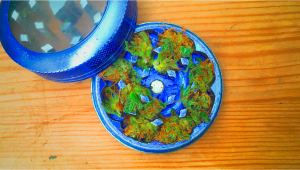
- 1. What is a grinder and what is it for?
- 2. How to choose the right grinder?
- 2. a. Do consider the grinder's size
- 2. b. The number of pieces and features
- 2. c. Weight only matters concerning grinders
- 2. d. Choosing the right grinder material
- 2. e. The personality of your grinder, a.k.a the design
- 3. Grinder options ranked
- 4. Not a fan of grinders? no problem!
- 5. The bottom line
When we consume marijuana, almost every method of consumption will involve using a grinder. Whether it is for rolling a joint, packing a bowl, or cooking some edibles, you'll most likely need to use a grinder in the first instance to break up the buds. And while some might underestimate the importance of using the right grinder, the fact is that the grinder you choose can make or break your smoking experience, in both a metaphoric and literal way.
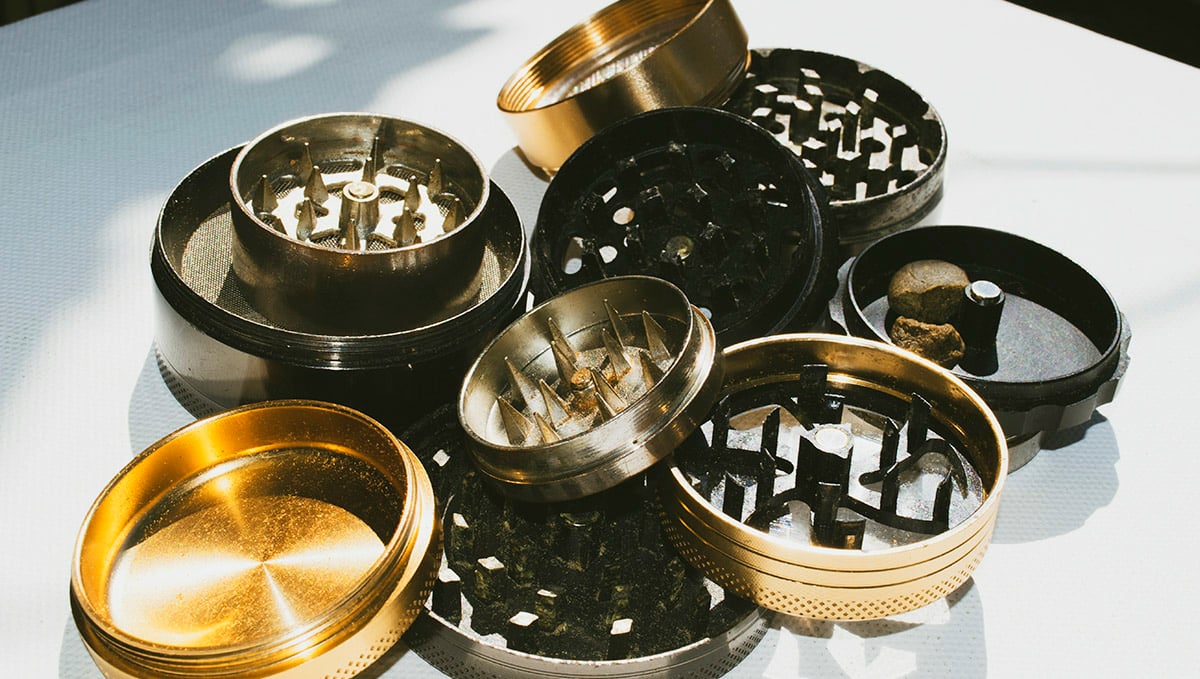
A good grinder is one that breaks up the buds evenly, without leaving any huge pieces of bud, or the contrary, without turning your weed flowers into powder. So if you still don't have a grinder and you're looking for a guide to buy the right one you've landed in the right place.
1. What Is A Grinder And What Is It For?
In case you're extremely fresh out of the oven in the culture of cannabis and you're yet unaware of what a weed grinder is, don't be scared to ask, we've got the answer for you.
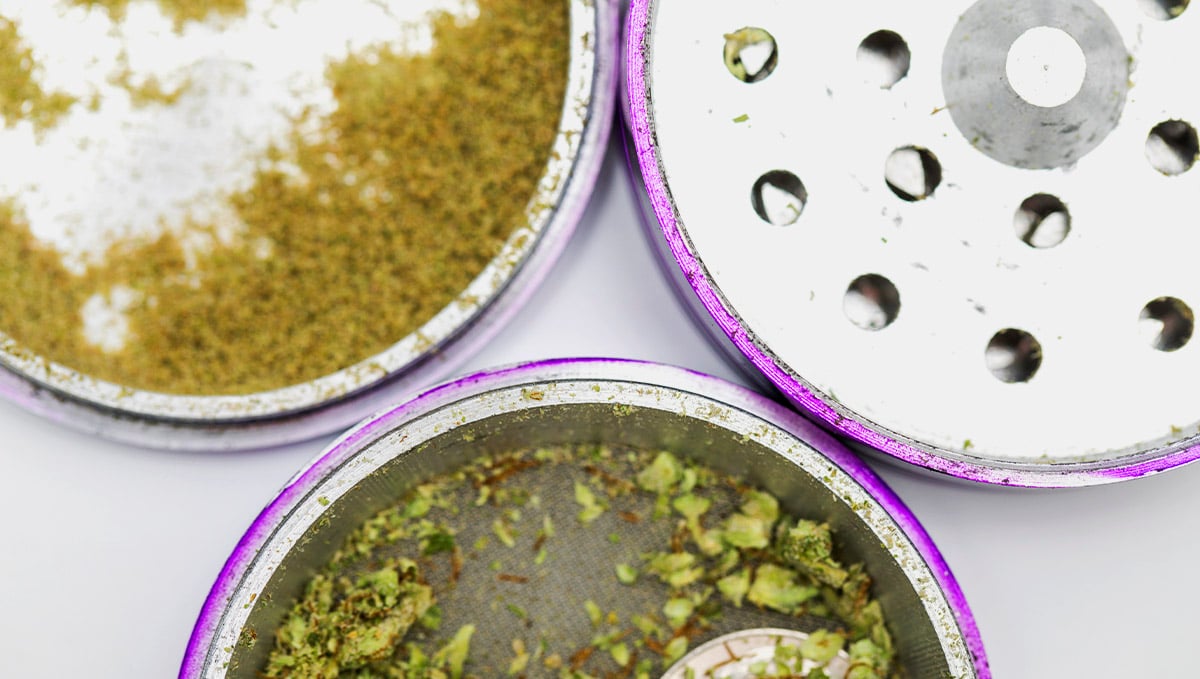
A herb grinder is a small, usually round-shaped device used for breaking up any sorts of smoking herbs, such as tobacco or marijuana. These instruments were brought to make our lives easier, back in the day before grinders were invented, people would use their hands or scissors to grind their herbs.
Did you know?
Did you know that the first grinder to be created was in the year 1905? It was by a couple of Australian guys who lived in Victoria. They applied for the patent on April 19th of that year, one day before 4/20, coincidence? Don't think so.
And while the first grinders were created far back in 1905, not much has changed since then. Yes, some major designing and aesthetic changes have taken place but apart from that, things still run the same way, the mechanism worked from the beginning so why change it?
2. How To Choose The Right Grinder?
While buying a grinder might seem not too relevant, keep in mind that you'll be using this object on a daily basis, perhaps even more than once a day. Therefore, you'll want to make sure that the grinder you buy is a good one. But what exactly makes a grinder a good grinder?

A good grinder is one that grinds your herbs evenly, to a size that's small but not so small that your weed ends up clogging the joint as you try to smoke it. But when it comes to grinders, although it could seem something quite easy to purchase one, there are so many options in the market, varying in different aspects such as:
- Size;
- Material;
- Weight;
- Build;
- The number of layers, and more.
Therefore, in order to choose the grinder that's perfect for you, you'll need to understand the differences between each of these aspects.
Do Consider The Grinder's Size
One of the most important aspects to take into account before you purchase your grinder is the grinder's size, size does matter. Before you even start to compare different grinder sizes you need to think of the uses you're planning to give to your grinder. Are you planning to carry your grinder around everywhere, making it a portable grinder? Or will you rather use your grinder in your living room or bedroom at home? Do you see where we're going? Big grinders and portability don't really go hand in hand right?
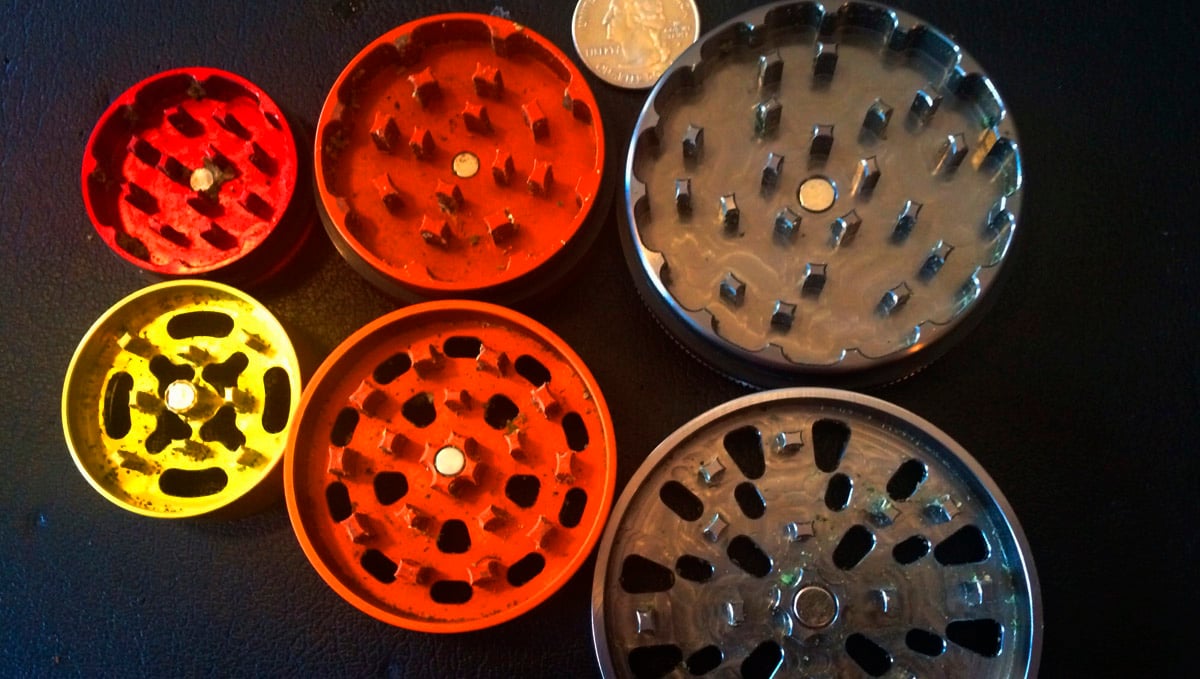
Bigger grinders normally translate into heavier weight as well, so if you're going to be carrying your grinder around on you everywhere, unless you want to add half a kilo into your bag every time you leave the house, we'd suggest getting a smaller grinder. When it comes to grinder sizes, they come in every single variety you can imagine, from micro, teeny tiny to extra large and extra-extra-large. A general rule would be, buy any grinder size of preference as long as it's a home grinder, and aim for medium to small sizes if you're going to make it a street grinder.
The Number of Pieces and Features
When we say the number of pieces we refer to the layers your grinder has, therefore, the number of features. The more layers to your grinder, the more features it will have (and the heavier your grinder most likely will be).
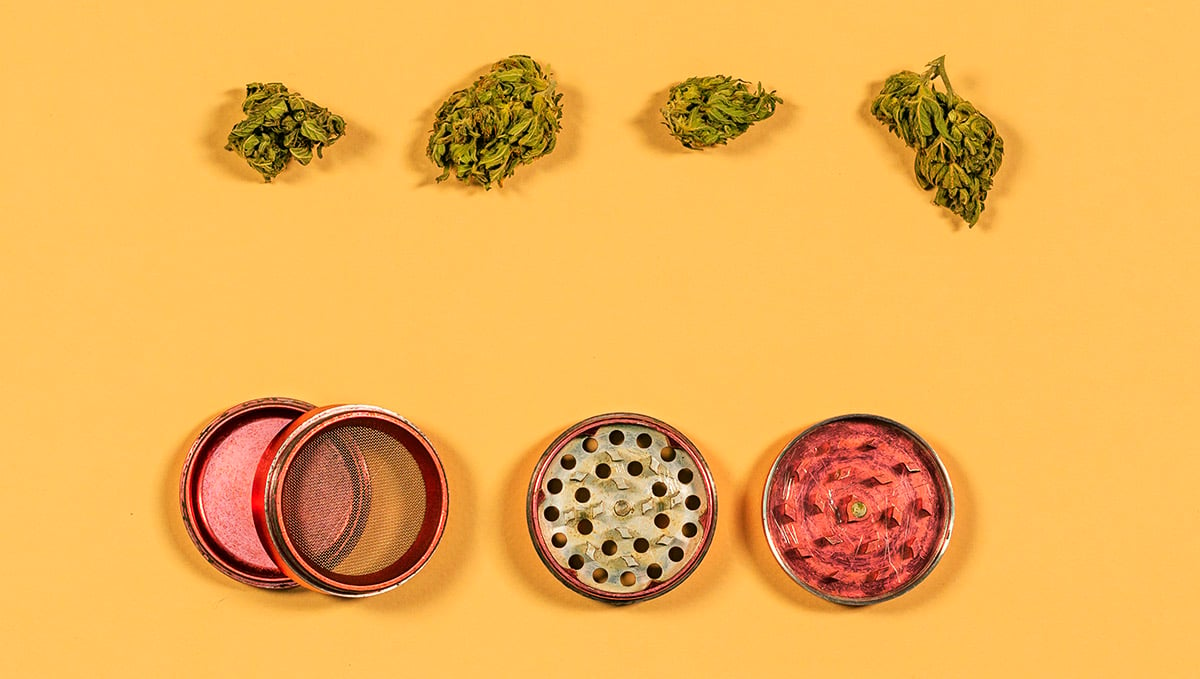
Grinders usually come from 2 to 5 pieces, 2 being the simplest grinder and 4 coming with several add-ons. Let's explain the features of each compartment.
| Number of grinder compartments | Features and utilities |
|---|---|
| Two-pieced grinder | Grinding only. |
| Three-pieced grinder | The grinding piece, plus a compartment for gathering grinded weed or collecting kief and pollen. |
| Four-pieced grinder | Grinding, plus grinded weed collecting compartment, and kief and pollen accumulator layer. |
| Five-piece grinder | Grinding, plus grinded weed layer, pollen and kief level, and a secret compartment for storing roaches or small buds. |
In two-pieced grinders, you'll be able to quench the need for grinding only. Three-pieced grinders will provide the extra feature of gathering the ground weed in a different compartment for easier access when rolling. Four-pieced grinders are luxurious in features, combining all the ones mentioned before, plus extra space for collecting some tasty and powerful kief or pollen. Five-piece grinders, and lastly, come with a usually secret compartment for stashing small buds, remaining roaches, or any other small stuff.
Weight Only Matters Concerning Grinders
The only time weight should actually matter is concerning weed grinders. As we've stated before, do keep in mind the use you'll give to your future grinder to avoid yourself some pain in the a$@!. Most likely, you'll need to get a portable grinder to carry on you wherever you're heading, therefore your piece should definitely not be too heavy that it becomes a weight on your back.
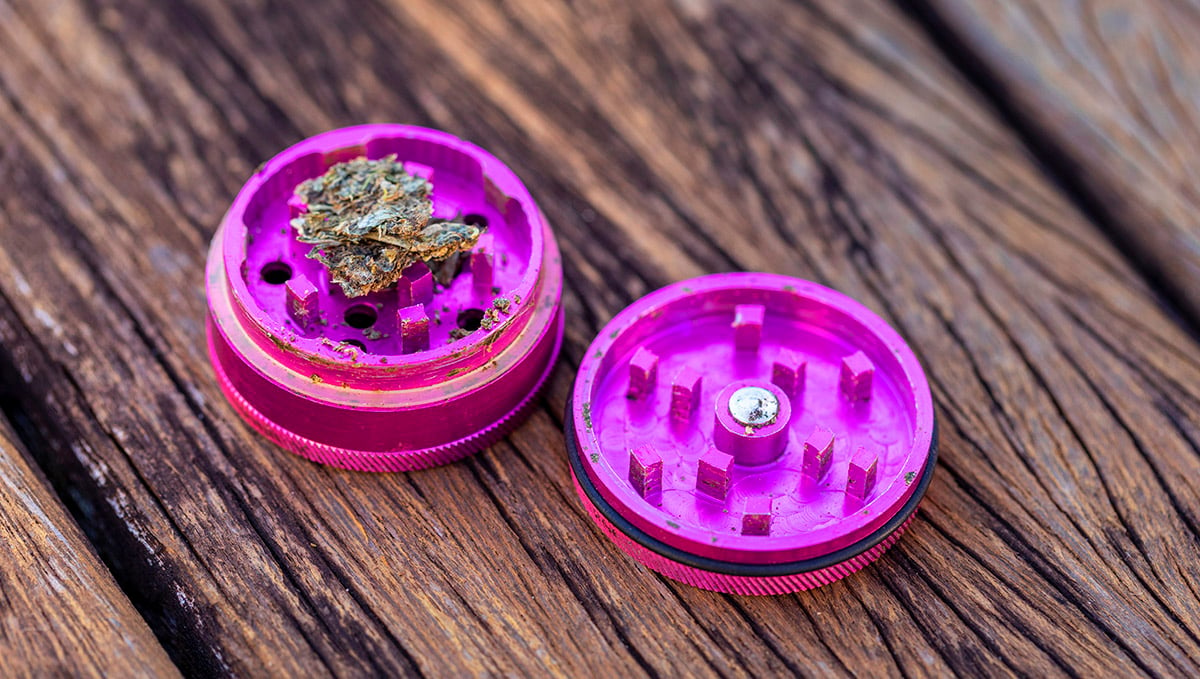
However, if you're looking to buy a grinder to use at home, undermind this point. Usually, the grinder's weight is strongly tied to its size, the number of layers, and most specifically, the build's material.
Choosing The Right Grinder Material
At this stage, you've probably gotten the idea of how important it is to keep in mind the weight and size of your grinder. Concerning the weight, one major influencing aspect is what material your grinder is made of. The material of your grinder isn't only important regarding the weight but for the quality of the gadget too. And keep in mind that the better the material, most likely the more expensive the grinder will cost, but since it is a long-term investment we're talking about, it's completely worth it.
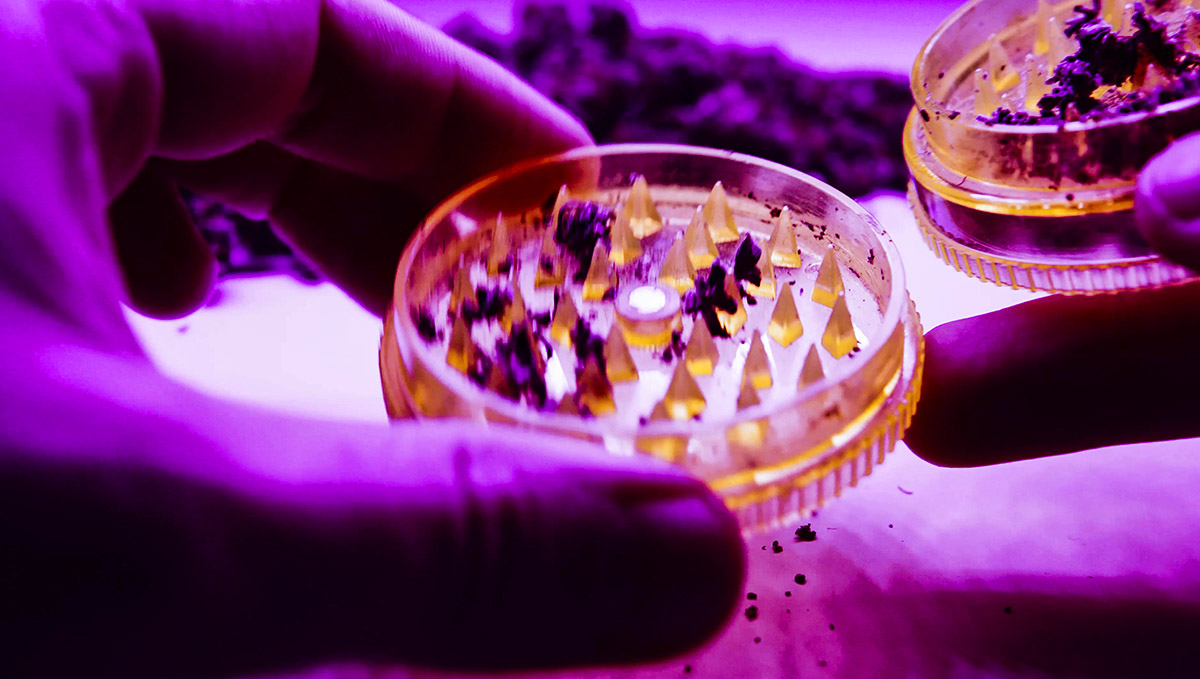
An ideal, quality grinder is one that is resistant to anything, crushes, falling, etc, etc. Our favorite grinder material is high-grade aluminum, which is as strong as a stone and will last forever, or until you lose it being too high.
However, aluminum grinders are the heaviest option, so aim for a medium to a small-sized one to avoid the grinder from being too heavy. Another great grinder material alternative is ABS (acrylonitrile butadiene styrene) plastic. These are quite resistant to the detriment of time and use and are extremely light in weight. Cheaper grinder materials include plastic, acrylic, or wood. And just like most things cheap, they can be good in the beginning but in the long run, they won't be as durable as a good grinder and by buying several cheap grinders you'll end up spending even more money.
The Personality of Your Grinder, a.k.a The Design
One last but not least important aspect to consider before buying a grinder is its design. No, the design isn't irrelevant, you'll be using this object every day for a long time, if not the rest of your life, dramatic. Therefore, might as well get something that isn't only useful but resembles your personal taste as well.
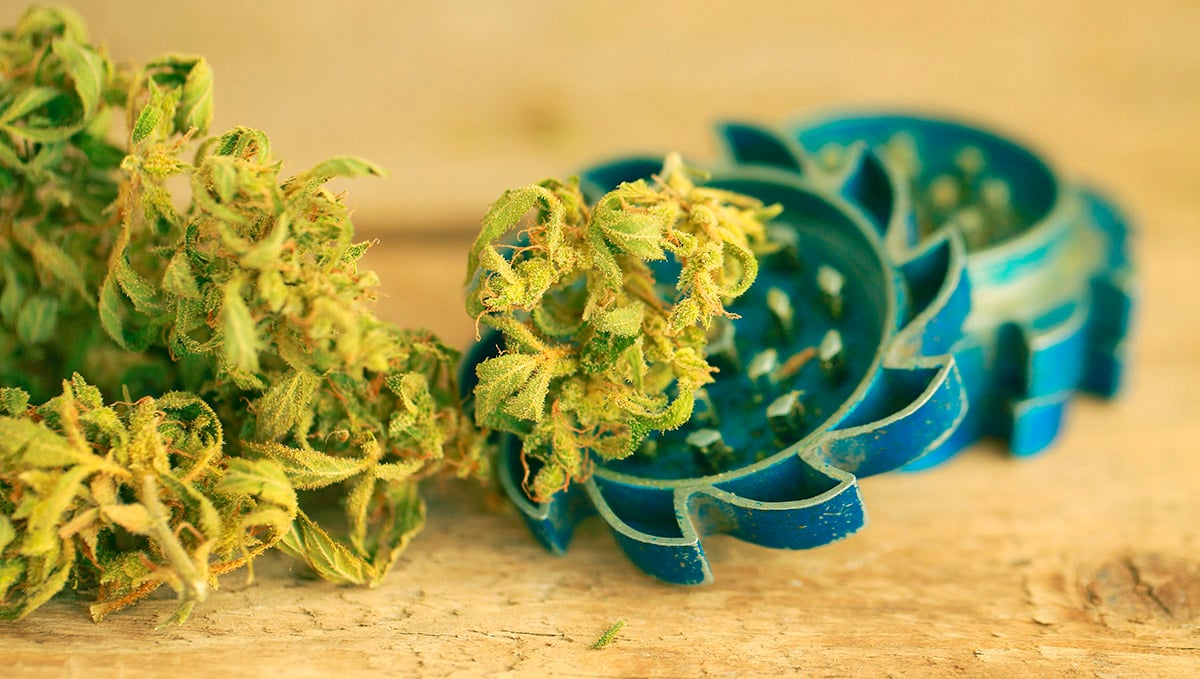
If we were still stuck back in 1905 where the design was indeed the least important aspect of a grinder, we'd get it. But now we're living in a world surrounded by designs suitable for every single person's likings. Go wild and choose a vibrant colored grinder, perhaps a metallic or holographic one even. Crazy shapes and patterns? They're well welcome! Don't narrow your search when it comes to personal taste, after all, the type of grinder you pull out when you roll a joint with someone can tell a lot about you. Show me your grinder and I'll tell you who you are.
3. Grinder Options Ranked
Ok, so we have laid out the basics things to keep in mind when looking at all the different grinder options. But how about the overall products? Let’s run down the worst to best grinder options. We took a quick pool throughout the Fast Buds office to see how everyone feels about the various grinder styles and here is what we came up with…
Wooden Grinders
Among the cheapest options out there, and for good reason. Let’s just say it, wooden grinders suck in a couple of key ways. First up, the grinding teeth are usually just blunt metal pins. These do a horrible job of grinding anything that is not perfectly dried and cured, and even then they can struggle to bust through properly dense buds.
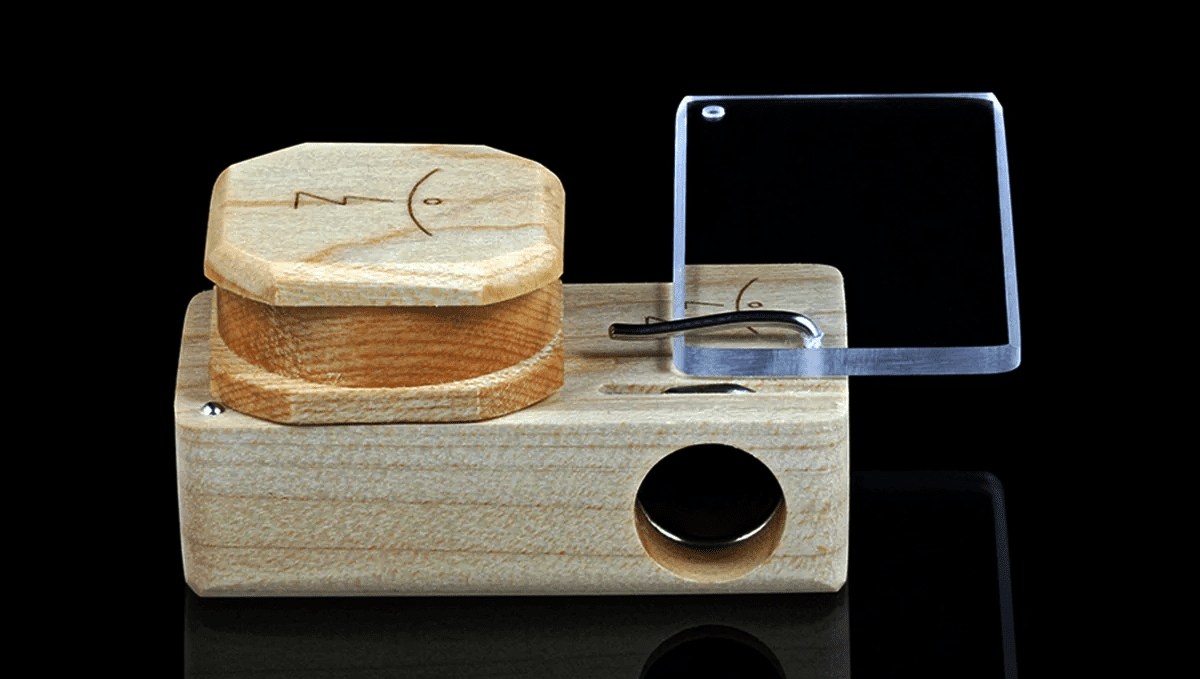
They can also be notoriously hard to twist once they have seen a little use. They are almost exclusively 2 piece jobs with no kief catcher in sight. 4/10 is being generous.
Acrylic Grinders
Acrylic, or plastic, grinders are a very close second worst. They suffer from the same twisting issues as their wooden counterparts and are easily broken. The reason they are not ranked as the absolute worse is the fact that they are easier to clean than wood grinders, and the pyramid-shaped teeth do a much better job of evenly chopping your weed. They can usually handle a decent amount of bud, and you can find options that include a kief catcher. We may be being slightly harsh here. Acrylic grinders are not that bad, and for the price (which is usually super cheap), they are actually just OK. 6/10
Metal Grinders
Every single serious stoner should have a metal grinder in their smoking kit, no doubt about it. They come in a wide range of shapes and sizes, but most utilize sharp diamond-shaped teeth that can handle even the dankest nugs with ease. Most will offer at least a dedicated kief compartment, if not a stash spot for weed also.
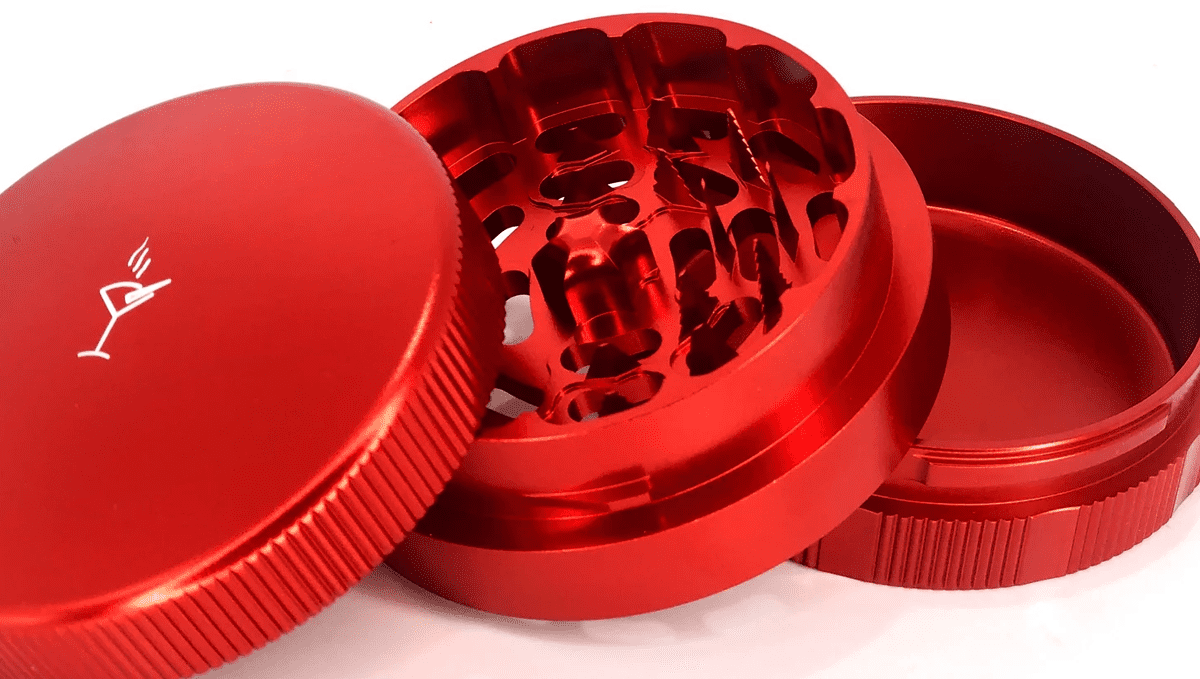
And sure, while these are definitely the most expensive option, they are worth every cent. Thanks to the super effective grinding teeth alignment they can be a little tricky to clean, but a quick spray of isopropyl will help loosen everything up nicely. 10/10
Other Options
The two other main options (apart from a pair of scissors) are card grinders and electric grinders. They both actually do a pretty good job, but they can't hold their own against a trust old metal grinder. Card grinders work in the same way as a cheese grater, and will handily slip into a card slot in any wallet. They can cause the ground weed to spray about, so be sure to use them over a large bowl. Easy to clean, very accessible, and almost impossible to break. 8/10
Electric grinders usually resemble a tiny stick blender. They usually take a single AA battery and can grind up a small amount of weed (0.5 grams) pretty successfully. Unfortunately, in our experience anyway, they are prone to breaking and the battery life leaves something to be desired.
4. Not a Fan of Grinders? No Problem!
Ok, so while most weed connoisseurs agree that grinders are the best way to get those dense, stinky buds to the point of being ready to smoke, they are anything but the only option. In fact, depending on where you live, you may have a totally different 'chop-up' option that is more common. There are a couple of key points to consider when using anything other than a grinder, though. One of the best things about using a grinder is that it gives you a consistent chop size every single time, and they are designed to offer the perfect consistency for joints and bowls. This takes a bunch of the guesswork out of the process, which is especially useful if you are already stoned, or if you are not used to using but a grinder for the job.
They also catch all of the 'kief' (trichomes) that can and will fall during the chopping process, which saves you from wasting any of the precious crystals that contain all of the cannabinoids and terpenes. So, if you are going to use anything but a cannabis-specific grinder, make sure to keep the consistency in mind (you do not want to over-chop your weed, as this can and will cause blockages in the joint or spliff - or even mean that the hole in your bong bowl will just swallow up the weed before it lights up). And always break your buds up over a bowl (or something else to catch the kief).
Scissor Chopping
Probably the second most common implement used for breaking up buds worldwide are scissors. If you are in a pinch and don't have a grinder, scissors will do a perfectly acceptable job, and they are actually the preferred weed-chopping implement in many countries, Australia and New Zealand being chief among these. When using scissors for the job at hand, the best method is to break the buds up into easy-to-pinch chunks. Grab a chunk and hold it in between your thumb and index finger, and carefully chop it with the scissors in between your digits. Go slow, and keep the pressure between thumb and finger to stop the bud just simply falling out.
Another option is to put the bud into a small cylindrical container (old camera film canisters are perfect, but where do you even find one of those in the digital age?) and dip the scissors straight in. Then you can go wild, chopping away until the desired sized chop is completed.
Using a Knife and Chop Board
If you have landed right here, right now, then chances are weed is your favorite 'herb'. But would you use a grinder to chop up a bunch of parsley, cilantro, or rosemary? I doubt it. If you are a confident home cook and are used to using a sharp knife and chopping board then you can go right ahead and do the same with your weed. Just make sure you are using a super sharp knife to avoid any crushing of the buds and work slowly on a clean board. This is the preferred method in a bunch of countries, with many Asian and African cultures being particularly famed for their knife skills when it comes to weed.
Don't be afraid, just go slowly and find a rhythm that works for you and be careful not to over-chop that stick-icky. You may also want to have a dedicated knife and chopping board for this, especially if you're dealing with super frosty weed.
Finger Chopping
Humans and cannabis have evolved together for millennia untold. We all have a dedicated system within our bodies (the Endo-Cannabinoid System - ECS) that is there to interact with the cannabinoids found purely in cannabis. If this doesn't point to the fact that we and weed have a long and intertwined history, we don't know what does. So, it kind of makes sense that we are all perfectly equipped for breaking up weed without the need for any additional equipment. It's not like there were any grinders available before the early 70s, but we have surely broken the good stuff up for thousands of years (and probably more like hundreds of thousands of years).
And while we are pretty sure that they are a bunch of weed-chopping methods that have been lost to the sands of time, it's safe to assume that simply finger chopping was the go-to method pretty much all around the world. Finger chopping is still a great option, and is super quick and easy. And, on top of that, there is something super satisfying about using your hands to break up weed. Just be sure to work slowly, and keep the pressure in check - the last thing you want to do is over-squeeze and compact everything right down. And if you're finger-copping a big old bunch of buds, don't let that finger hash go to waste!
5. The Bottom Line
The world of weed grinders can be complex and paradoxically simple at the same time. All you'll need to take into account is that the grinder you grind will take part in many future anecdotes, therefore it's important that you choose one that you think of fondly and enjoy using. Don't forget to comment on what your favorite grinder types are below!







Comments